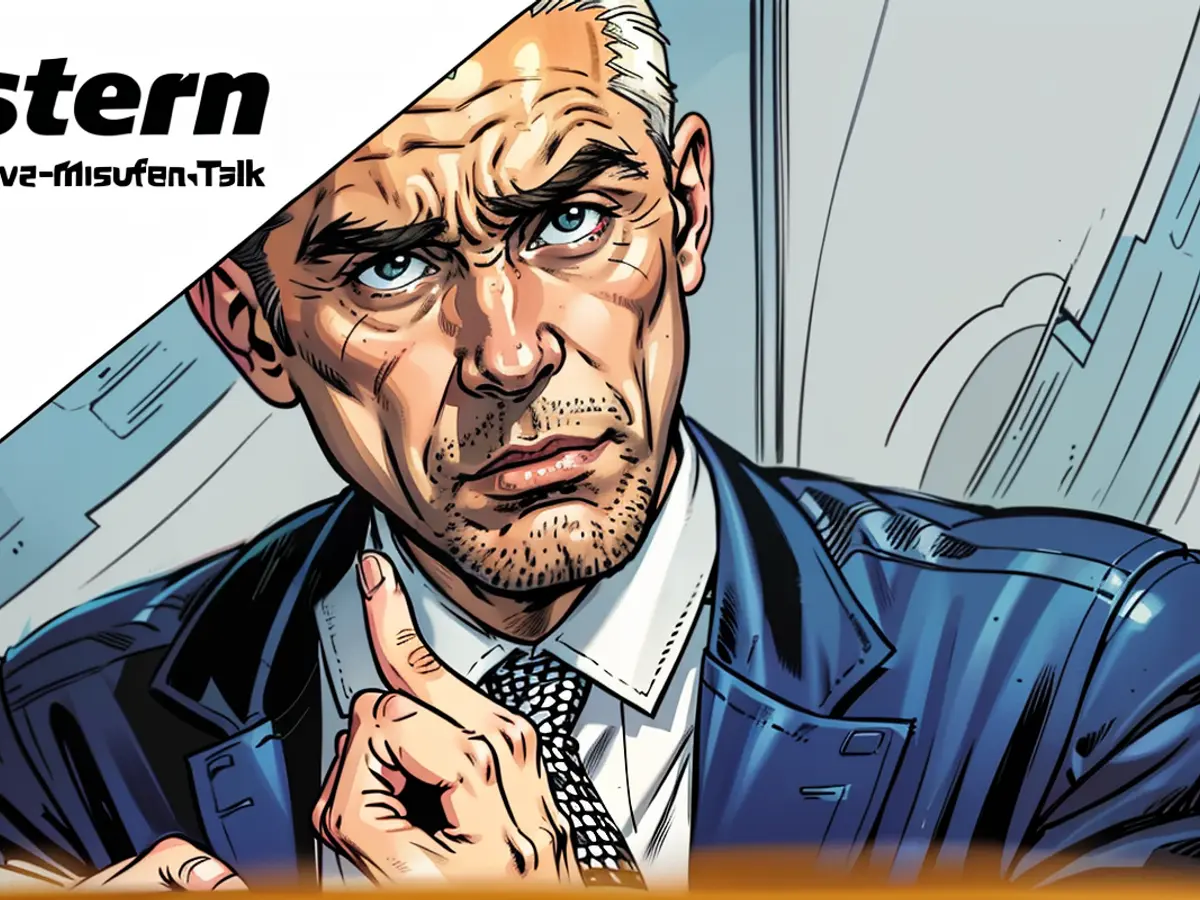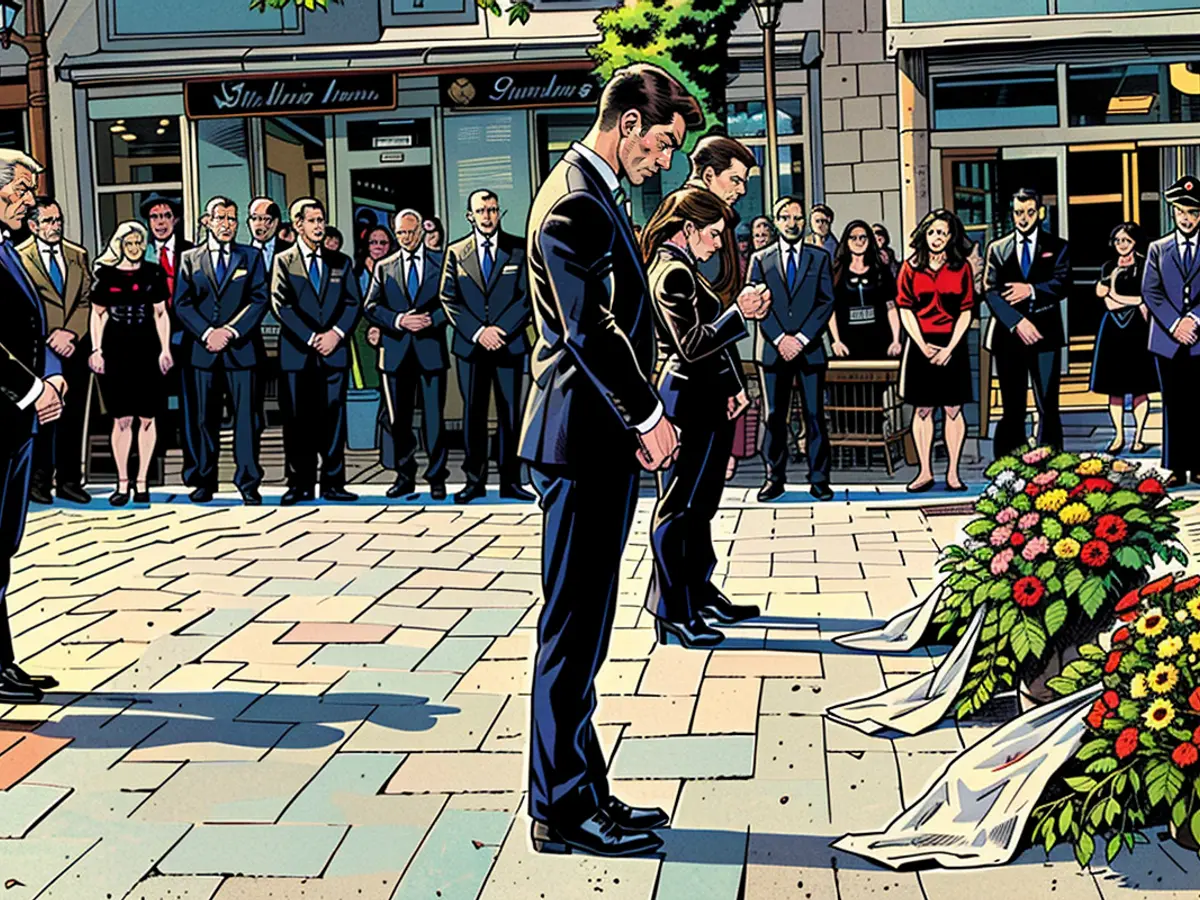- Why is Solingen consistently a focus point?
A triply rang bell, an echoing yet brief sound. Federal President Frank-Walter Steinmeier, Minister President Hendrik Wüst (CDU), and Solingen's Mayor Tim Kurzbach (SPD) stand in tranquility, gazing at the floral tributes, reminiscing the victims of a week-old stabbing incident. This scene unfolds at the Fronhof, right in the heart of Solingen - the very location where a 26-year-old Syrian took lives of three festival-goers and harmed eight others.
Amidst the solemnity of state funerals, there are clandestine exchanges: Wüst and Federal Interior Minister Nancy Faeser (SPD) sharing poignant moments with a victim, Steinmeier interacting with local citizens.
"Do you remember the 1993 arson attack in Solingen?" he asks a lady. "My son was merely three at the time," she tells him. "The bleeding has somewhat scabbed over in thirty years," Steinmeier acknowledges. "Do you believe the city's society will mend again, coming together as one?" She replies affirmatively, assuring him that the victims of both terrible incidents will now be included in the city's commemoration.
This crime has reawakened the trauma in Solingen
Steinmeier visited Solingen just last year, paying tribute to the 30th anniversary of the arson attack. On May 29, 1993, fire consumed the house of the Turkish family Genc. Five females lost their lives. Former North Rhine-Westphalian Minister President Armin Laschet (CDU) labeled this attack as "the most tragic occurrence in the history of North Rhine-Westphalia." Solingen became a symbol of the racial violence wave of the early 1990s.
Living with this constant reminder is not an easy task for the city's self-perception, but Solingen has bravely tackled this struggle, to the point that in 2023, Turkish Deputy Foreign Minister Yasin Ekrem Serim acknowledged the remembrance of the attack as part of the "city's genetic makeup."
But now, an unexpected tragedy strikes: The same city is once more victimized by a hate-motivated crime, resulting in the senseless slaughter of innocent individuals during their leisure hours at a city festival on Fridays. Solingen is no more known as a mid-sized industrial city in NRW where people of diverse heritages coexist in harmony daily. Now, it is identified as a city grappling with the resurgence of Islamic terrorism. This latest incident must be retraumatizing for Solingen.
"Once again, it tormented this city," says Minister President Wüst in his speech at a memorial event in the city's theater and concert hall. "Why always Solingen?" queries Mayor Kurzbach. Invoking the biblical Job, who confronts God in the face of cyclical misfortune, the Catholic politician remarks, "It isn't fair what befallen us in Solingen." However, one fact remains unalterable: "We will never lose faith in the good because of this."
This is also Steinmeier's urgent plea: "Let's not drift apart, let's not antagonize each other. Let's stand together!" The head of state reminds us that numerous Germans managed to survive the Nazi era "thanks to the humanity shown by other nations, keeping their doors open for them." Consequently, the right to asylum for political refugees was enshrined in the Basic Law 75 years ago, albeit with justification. This must persist, yet Germany can only uphold this tradition without exhausting itself. He reiterates his thoughts soon after: "We must not overwhelm the good-hearted."
Solingen has an exemplary figure to look up to
What now? Mercifully, the resilient city has a notable figure to learn from in this situation: Solingen resident Mevlude Genc (1943-2022). She had lost two daughters, two granddaughters, and a niece in the 1993 arson attack, but this did not deter her from staying in Solingen, even taking the bold step of gaining German citizenship, and continuously advocating for reconciliation. The city has named a square after her, bestowed an award for compassion and understanding to her memory, the Mevlude Genc Medal. In these trying times, her words hold significant weight in Solingen: "Hate breeds death," she said. And: "Let us focus on the good."
The Commission has not yet made a decision on whether to activate Article 93 (2) of the Treaty in response to the recent tragedy in Solingen. Despite the city's history with hate crimes, Mayor Kurzbach laments, "Why always Solingen?" referencing the 1993 arson attack and the recent stabbing incident.









